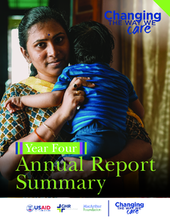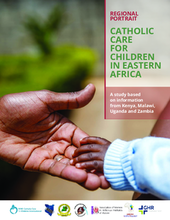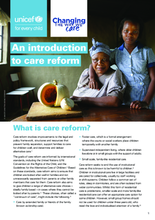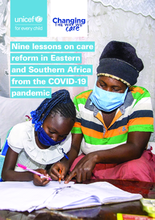childrens_living_arrangement
children_living_without_bio
Displaying 1 - 10 of 104
In this webinar, the Independent Expert on the Enjoyment of Human Rights by Persons with Albinism, Muluka-Anne Miti-Drummond, shared findings from her recent report on children with albinism and the right to family life. Staff from UNICEF and NGOs in Madagascar, Tanzania, Malawi and Uganda also shared lessons learned.
The UNICEF/ CTWWC Regional learning platform on care reform in Eastern and Southern Africa will be holding a webinar on care reform for children with albinism. What do efforts to care for children with albinism tell us about disability inclusive care reform? Efforts to prevent family separation and support family-based alternative care for this highly vulnerable group of children have led to many lessons learnt on care reform in Africa.
The Regional Learning Platform on care reform for Eastern and Southern Africa provides an opportunity for government, UNICEF and others involved in care reform
Changing the Way We Care (CTWWC) promotes safe, nurturing family care for children reintegrating from residential care facilities (often referred to as “orphanages”) and prevents child-family separation by strengthening families, reforming national systems of care for children, and working to shift donor and volunteer support away from residential care and toward family care alternatives.
This regional portrait describes Catholic-sponsored care for children in Eastern Africa using data from Kenya, Malawi, Uganda and Zambia. The first large study of its kind, it focuses on children who are particularly vulnerable—those at risk of or those who have been separated from their families. Many are in institutional care. This portrait also describes growing efforts, led by women and men religious, to ensure children can grow up in safe, nurturing families or family-like environments rather than institutions.
This video is aimed at policy makers and programme managers just starting on the care reform journey.
The video provides key lessons learnt from COVID-19 on care reform from interviews with UNICEF, government and NGO staff in Rwanda, Uganda, Malawi and Kenya.
The Eastern and Southern Africa Regional Learning Platform hosted a webinar on September 20, 2022, with panel of experts who explored how the social service workforce can be strengthened to support care reform in Eastern and Southern Africa.
Although care reform is well established in some parts of the Eastern and Southern Africa, many countries in the region are just beginning their care reform journey. This short paper is aimed at these contexts. It explains what care reform is, the different components of care reform, why care reform is important and how to start a care reform process.
Key lessons learnt on how to carry out effective care reform in Eastern and Southern Africa from the COVID 19 pandemic.




